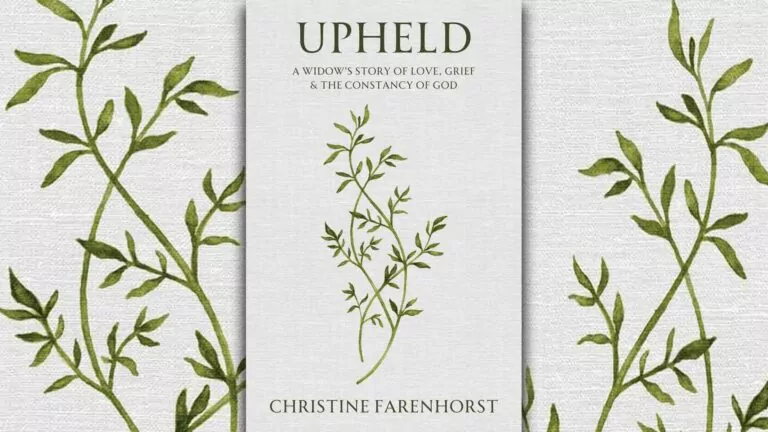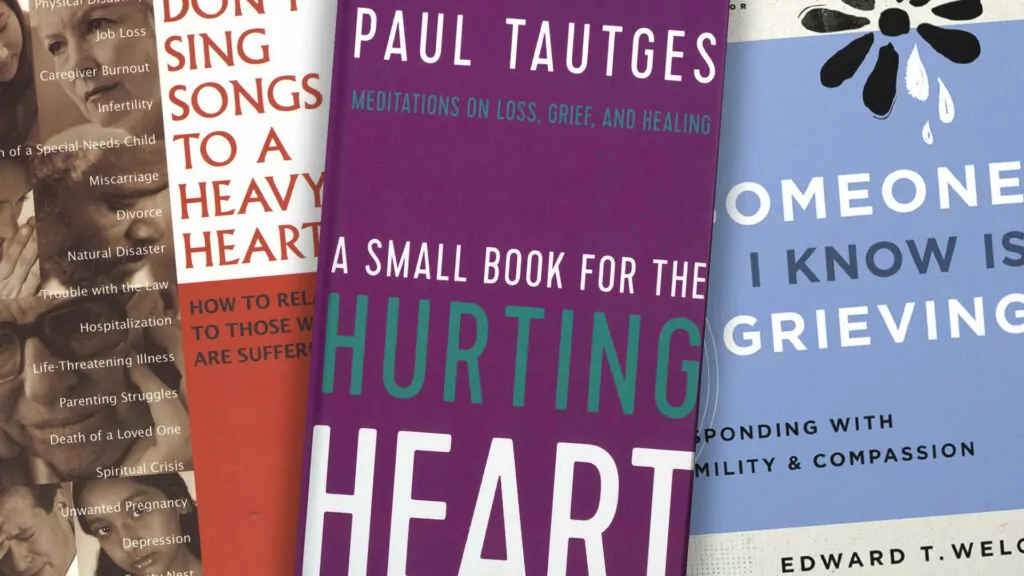by Christine Farenhorst
2025 / 252 pages
Rating: Good/Great/GIFT
Anyone who has ever loved is going to face loss, and what are we to do then? It’s not a thought I like to dwell on. But as I age, and as I attend more funerals of godly men and women, I see whole families who are mourning, not as those without hope (1 Thess. 4:13), but as those assured that Christ’s victory over death is our victory too.
But what does that assurance look like in the day to day? Here is an answer.
Christine Farenhorst was married to her Anco for almost 53 years, and Upheld is the story of their life, and her loss after Anco died in 2022. Here we have someone wrestling with one of the greatest losses any will face, assuring her beloved readers that yes it’s really true “that in all things God works for the good of those who love him” (Roman 8:26). Or as she puts it:
“When we are pushed off a cliff, whether that cliff is war, cancer, a snub by a friend, the death of a mother, being maligned and slandered for standing up for the truth, or suffering a stroke – it is of prime significance to note that God has let this happen so that we can die to ourselves and live for Him. He only works for our good.”
That assurance worked itself out throughout Anco and Christine’s married life. She shares story after story of relying on the Lord, and looking for the good He was bringing. So when, for example, the Christian Reformed Church was slowly capitulating to women in office, and to a non-literal understandings of the opening chapters of Genesis, she could be grateful.
“Strangely enough, although the Word of God was watered down in many pulpits, this visible bruising of the church became a blessing to our family. It was as if Joseph said to us: ‘Others mean this for evil, but God means this for your good, to bring about that many people should be kept alive …. So do not fear: I will provide for you and your little ones.’ And God did provide for us. The slippery slope exhibited within the church proved to be the tilt that caused our family to climb up and study God’s Word in such a way as we never would have done had there been no issues. Consequently, our children were taught male headship by both Scripture and by Anco’s example; they were grounded in the fact that God hates all sexual sin; and they were spoon-fed on the historicity and infallibility of the Bible.”
When you understand that God is always working on you, and through you, then you start to see rightly that what’s in front of you is always another opportunity to glorify your Creator. And throughout their lives together, Anco and Christine had quite some opportunities!
In one of my favorite passages Christine shares how, when Anco was still in veterinary school and they were living the life of poor students, they’d be grateful for any lunch or dinner invites. However, one of their invites was from an elderly couple, the Pots, who were “rather impoverished themselves.” So when Mrs. Pot offered her a pastry, Christine was horrified to discover, after a couple of bits, that her piece was full of mold. Should she say something? The elderly woman was quite delighted with her own piece: “Isn’t it good? I’ll bet you haven’t eaten anything like this for a long time!”
“Mrs. Pot beamed at me again and a patch of sunlight caught a faded spot of the carpet. I knew she considered both Anco and myself underfed, and had taken great pains to buy something special for us.”
And so, Christine ate it all down as quickly as she could, and when asked whether she’d like another piece, she “croaked a trifle hoarsely” that no, she did not, “but it was delicious.”
“[Mrs. Pot] appeared very pleased with the comment, and I knew that my statement, strange as it sounded to my stomach, was Gospel truth to my heart.”
Sometimes a lie is no lie at all – the cake was both disgusting and also delicious; stomach-churning, and heart-warming all the same.
One of the benefits of reading biographies of godly men and women is that they have sometimes, in God’s grace, triumphed over a pitfall we are still getting tripped up by. So their example can show us the way. Today one pitfall the Church has is an eagerness to be respected, or at least tolerated by society. We wanted to be liked. But in the Bible we’re repeatedly told that we will be cursed because we love Jesus (Matt. 10:22, Luke 6:28, Ps. 109:28, etc.). And what does that look like, and how should we act when it happens?
“Anco was once asked by someone, someone who disliked him intensely, to come for a meeting in a Tim Horton’s restaurant, so that she could speak with him. A very liberal woman, one who had wreaked havoc within the church community, she had also spread slander about him. He went and was reamed out in such a loud manner by this female, that people in surrounding booths turned their heads to look. It was embarrassing as well as demeaning. Anco listened quietly and let her go on and on. The woman ended the public diatribe by saying: ‘You are a narrow-minded bigot. It’s like you’re in a box and you don’t allow anything else in that box.’ As she was sounding off this last statement, she drew the picture of a box on the booth table with her right index finger. Anco waited a moment to make sure she was done. Then he took his Bible and placed it in the box.”
I could share one passage after another – there is so much to love – but I’ll content myself with just one more, a section I read to my daughters about Christine’s wedding… interrupted. Husband-to-be Anco was already waiting at the front of the church when a late-arriving 5-year-old nephew slipped on the snowy steps outside and knocked himself unconscious. The boy was taken to the basement and Christine’s sister, one of the bridesmaids but also a doctor, went to see if she could help.
“My father, about to escort me into the church but anxious about his oldest grandson, also departed. Consequently, no matter that I was resplendent in my wedding finery, I was left alone in the church foyer with the caretaker. He was a man of few words and simply stared at me in mute sympathy.”
And so, Anco, best man beside him, stood up front unsure of just what was going on. For the next 15 minutes the organ continued to play as the whispering among the pews increased. Thankfully her nephew turned out to be fine, and the wedding resumed. But oh, what a start!
So who would love this book? I don’t know that I would give it to anyone who has recently experienced the loss of a loved one. But it’d be a wonderful book later. And important beforehand.
Just how good is it? Well, it ranks at the top of my own rating scale which goes something like this:
- Didn’t like it
- Enjoyed it
- Enjoyed it enough to recommend it
- Loved it so much I had to read sections out loud to my wife and/or kids
- Loved it so much, I have to put this in folk’s hands
I’ve bought ten copies and my daughters will be among the first to get a copy. But I wanted plenty more, because I’m sure this will be a much-appreciated present to other family members and friends.












